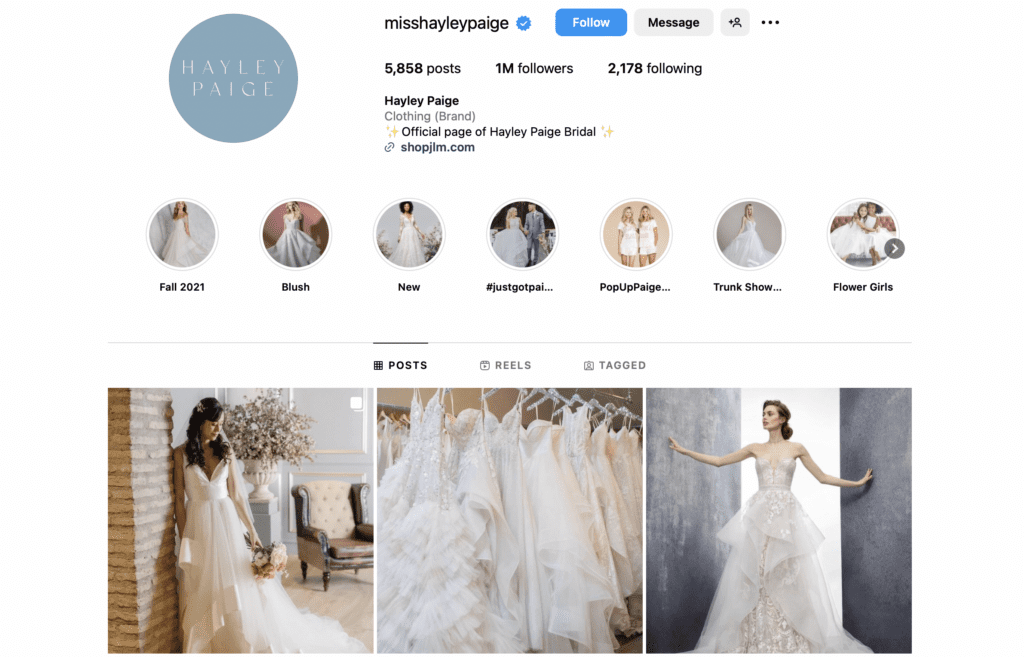A New York federal judge issued a mixed ruling in the latest round of an ongoing case between Hayley Paige Gutman and her former employer over the use of her name, including in a number of social media handles. First things first, in a May 8 opinion and order, Judge Laura Swain of the U.S. District Court for the Southern District of New York walked back on her previous grant of control of the “Hayley Paige” social media accounts to JLM Couture, holding that based on the framework set out by the U.S. Court of Appeals for the Second Circuit early this year, JLM failed to demonstrate a likelihood of success in establishing that it was the original owner or transferee of the accounts. And in fact, the evidence indicates that Gutman originally owned the accounts and never transferred them to her former employer.
For some background: JLM Couture filed suit against Gutman back in December 2020, accusing the wedding dress designer – who previously helmed the JLM-owned Hayley Paige brand – of trademark infringement and dilution, unfair competition, breach of contract, and conversion, and claiming exclusive rights in the “Hayley Paige” name in accordance with the terms of her 2011 employment agreement. Following failed contract negotiations and a behind-the-scenes dispute over the @misshayleypaige Instagram, Pinterest, and Twitter accounts, JLM filed suit, seeking to enforce a noncompete in Gutman’s contract and to gain control over the social media accounts.

In March 2021, the district court awarded JLM a preliminary injunction, barring Gutman from competing with it through the end of her contractual term and from using her name to do so, including via the disputed @misshayleypaige social media accounts for the duration of the litigation. Following an appeal to the Second Circuit, Judge Swain modified the injunction to give JLM exclusive control over the social media accounts. In a more recent decision in January, the Second Circuit vacated part of Swain’s modified injunction and remanded the case back to the district court to reconsider ownership/control over the accounts and the validity of the non-compete.
Reasonableness of the Noncompete Clause
In addition to dissolving the control aspect of the modified preliminary injunction that she entered in March, Judge Swain reconsidered the validity of the noncompete clause in Gutman’s employment agreement with JLM in her recent opinion, namely, the reasonableness of the five-year restraint. In terms of the noncompete, Judge Swain stated that the Second Circuit specifically called on the court to consider: “(1) whether JLM made a sufficient showing that it has a legitimate interest warranting enforcement of a restrictive covenant; (2) whether [the] five-year term [in Gutman’s contract] is reasonable in duration; and (3) whether … the [noncompete] is reasonable in scope and not overly burdensome on Gutman.”
Legitimacy of Interest to be Protected: Reflecting on the first factor, Judge Swain asserted that JLM “has demonstrated that it has at least two legitimate interests warranting protection through enforcement of the [noncompete]: (1) the goodwill associated with [its] high-profile product lines that were built in conjunction with [Gutman] during her employment around the designer’s name that she transferred to JLM under the contract, and (2) its interest in a reasonable period of protection against unfair competition by an employee whose services, including service as both designer and public face of its main product line, were unique and extraordinary.”
“The evidence of collaborative sales and marketing activities during Ms. Gutman’s employment under the contract and the success of those efforts shows that JLM is likely to be able to establish that it has a strong cognizable interest in enforcing the restrictive covenant because [it] ‘has a legitimate interest in preventing former employees from exploiting or appropriating the goodwill of a client or customer, which had been created and maintained at the employer’s expense, to the employer’s competitive detriment,’” according to the court. And as distinct from “anonymous designers or ordinary marketing personnel,” Gutman was “a unique and extraordinary employee who … could have an unfair competitive advantage over JLM should she appeal to customers and prospective customers to abandon JLM for another manufacturer in the immediate wake of the termination of her employment.”
Duration and Geographic Scope: “There is no doubt that five years is a significant period of time,” Judge Swain stated, noting that New York courts have “often determined that non-competes of this length are unreasonable.” The difference here, according to the court, stems from JLM’s business model, which sees it work with designers to not only “build and promote namesake collections” but to also invest in/establish the “personas” of individual designers, like Gutman.
Against the background, Swain found that five years from the end of JLM’s employment relationship with Gutman is “a reasonable amount of time, and no greater than is necessary for JLM ‘to rebuild its brand, develop a new strategy and distance its products from Ms. Gutman, whose persona was intimately tied to the eponymous brand.’”
Scope of the Restriction: The specific restriction at play prohibits Gutman from “(i) being identified … as the designer of any goods in competition with goods manufactured and sold by JLM, or (ii) using, or authorizing others to use, [her] role as designer, to promote the sale, or any goods in competition with goods manufactured and sold by JLM.” Siding with JLM, the court held that this prohibition is “reasonable in scope and not overly burdensome on Ms. Gutman because it permits [her] ‘the ability to continue to use her talents as an uncredited designer of competitive goods or the (new) name and face of non-competing goods during the restricted period.’”
“These restrictions limit [her] conduct in a narrow (albeit potentially lucrative) portion of the clothing and accessories field and are tailored to protect JLM’s goodwill in [the Hayley Paige name], which Ms. Gutman assigned to JLM for commercial purposes pursuant to … the contract,” per Judge Swain.
With the foregoing in mind, the judge directed JLM to provide the current username and password for each of the disputed accounts to Gutman and ordered Gutman to abide by the terms of the noncompete through December 17, 2025.
THE BIGGER PICTURE: The interesting aspect of the court’s order on the noncompete front is that it comes in the immediate wake of the decision by the Federal Trade Commission to ban most new noncompete agreements. Specifically, the antitrust and consumer protection-focused agency’s final rule, which is expected to come into effect in late August or early September of this year, provides that it is “an unfair method of competition for persons to, among other things, enter into noncompete clauses with workers on or after the final rule’s effective date.”
Not only slated to impact new noncompetes, the FTC’s rule will serve to invalidate existing noncompetes for senior executives (i.e., individuals earning more than $151,164 who are in a “policy-making position.”). It is unclear whether Guzman would fall into this pool, although, it seems at least somewhat unlikely.
The case is JLM Couture, Inc. v. Gutman, 1:20-cv-10575 (SDNY).














